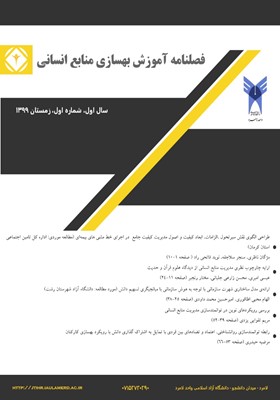تحلیل اثر سبک رهبری بر اخلاق حرفه ای معلمان با میانجی گری ویژگی های شخصیتی با رویکرد معادله ساختاری
محورهای موضوعی : مدیریت منابع انسانیعلی خالق خواه 1 , حبیبه نجفی 2 * , الهه سلطانی 3
1 - هیأت علمی دانشگاه محقق اردبیلی
2 - گروه علوم تربیتی
3 - دانشگاه محقق اردبیلی
کلید واژه: ویژگی های شخصیتی, سبک رهبری, معلم, اخلاق حرفه ای,
چکیده مقاله :
هدف: هدف از پژوهش حاضر، تحلیل اثر سبک رهبری بر اخلاق حرفه ای معلمان با میانجی گری ویژگی های شخصیتی معلمان مقطع ابتدایی شهرستان بستان آباد می باشد. روش شناسی: این پژوهش از لحاظ هدف، کاربردی، از لحاظ نوع روش، توصیفی- همبستگی و از لحاظ روش گرد آوری اطلاعات، میدانی می باشد. جامعه آماری پژوهش حاضر شامل کلیه معلمان مقطع ابتدایی شهرستان بستان آباد می باشد که تعداد آنها برابر 380 نفر می باشد. برای تعیین حجم نمونه از جدول کرجسی- مورگان استفاده شد و نمونه برابر181 نفر برآورد گردید. روش نمونه گیری، تصادفی طبقه ای می باشد. برای اندازه گیری متغیرها از پرسش نامه های استاندارد: اخلاق حرفه ای کادوزیر (2012)، ویژگی های شخصیتی کاستا و مک کرا (1992) و سبک رهبری باردنز و متزکاس (1969) استفاده شد. داده ها به کمک نرم افزارهای Spss20 و Lisrel تحلیل شدند. یافته ها: نتایج یافته ها نشان داد که سبک رهبری بر اخلاق حرفه ای با میانجی گری ویژگی های شخصیتی معلمان مقطع ابتدایی شهرستان بستان آباد اثر غیر مستقیم دارد. بنابراین می توان گفت که رابطه بین دو متغیر سبک رهبری و اخلاق حرفه ای توسط متغیر ویژگی های شخصیتی معلمان تشدید می شود و اگر ویژگی های شخصیتی معلمان بهبود یابد این اثر قویتر و اگر ویژگی های شخصیتی معلمان تضعیف شود طبیعتا این رابطه ضعیف خواهد شد. نتیجه گیری: مدیران مدارس باید با انتخاب سبک رهبری مناسب، سبب تقویت مؤلفه های ویژگی های شخصیتی در معلمان گردند تا اخلاق حرفه ای آنها افزایش یابد.
Objective: The aim of this study was to analyze the effect of leadership style on teachers' professional ethics through the mediation of personality traits of primary school teachers in Bostan Abad. Methodology: This research is applied in terms of purpose, descriptive-correlation in terms of type of method and field in terms of data collection method. The statistical population of the present study includes all primary school teachers in Bostan Abad, whose number is equal to 380 people. Krejcie-Morgan table was used to determine the sample size and the sample was estimated to be 181 people. The sampling method is stratified random. To measure the variables, standard questionnaires were used: Kadozier (2012) professional ethics, Costa and McCrae (1992) personality traits, and Bardens and Metzkas (1969) leadership style. Data were analyzed using Spss20 and Lisrel software. Results: The results showed that leadership style has an indirect effect on professional ethics through the mediation of personality traits of primary school teachers in Bostan Abad. Therefore, it can be said that the relationship between the two variables of leadership style and professional ethics is intensified by the variable of teachers' personality traits, and if teachers' personality traits improve, this effect is stronger, and if teachers' personality traits are weakened, this relationship will naturally weaken. Conclusion: School principals should strengthen the components of personality traits in teachers by choosing the appropriate leadership style.
_||_

